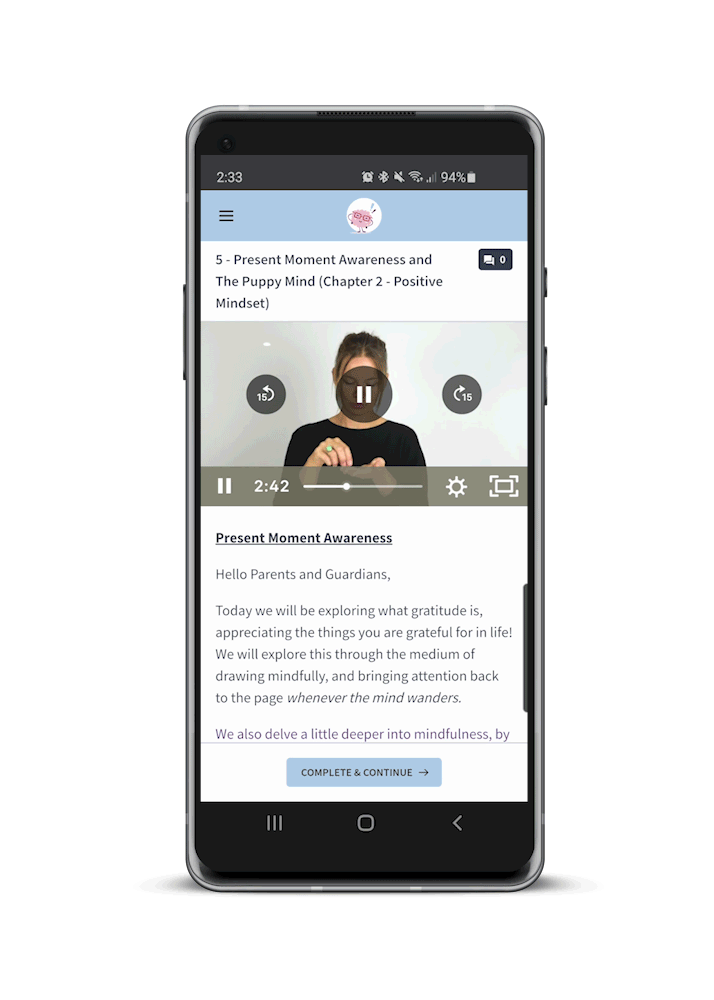.png)
Introducing fun & engaging
Mindfulness
The One Mind Wellbeing and Resilience Programme empowers teachers and inspires children to prioritise mental health - giving them the tools to self-soothe, to identify emotions and work through them, to validate and accommodate difficult times. This self-awareness builds resilience and emotional literacy!
We use a foundation of mindfulness to teach children essential life skills and steer them towards positive beliefs and emotions, giving every child the opportunity to thrive at school.
Interactive videos complement circle time and help the children to move towards a 'ready to learn' attitude, with no extra planning or marking for teachers.
All delivered with a smile, great energy, puppets, and props - perfect for 6-11yr olds!

Check it out!
Get an overview of the course here.

Mindfulness videos in
the classroom
The One Mind Programme sparks excitement about the brain and the mind - we want children to get excited about mindfulness, so they actually WANT to practice!
Interactive and fun – Emma provides opportunities to draw everyone into the playfulness of the session, through communication with both the teacher and the group. The format allows the teacher to become fully engaged, when pausing the video on the countdown screen, providing a window for discussion with the children on key themes as they arise.


Sneak peek of
the video course...




Emma Trinder is a qualified, experienced teacher and previous course leader of Photography at Fareham College (Ofsted Outstanding).
"I always enjoyed designing content and lessons that would fit the Btec criteria. It was so important to me to make learning fun and to engage."
The One Mind programme was designed with PSHE criteria in mind.
Take a look at our matrix for KS1 and KS2.


Proven benefits of a
daily practice
The key benefits of mindfulness, outlined in scientific research show that children with a daily mindfulness practice felt better about themselves, were rated as more pro-social by both themselves and their peers, and had better math outcomes than children who did not exercise mindfulness in their curriculum (Schonert-Reichl et al., 2015)
The course empowers children to make their own informed decisions and to gain a deeper understanding of what is right for them. Building confidence in this way also helps to balance emotions, increases emotional intelligence and decreases overthinking, making room for creativity and expression.


Some of the topics
we cover...
• What is mindfulness?
• Training the brain/mind
• Neuroplasticity
• Making decisions
• Emotional vocabulary
• React/respond - choices
• The mind and its stories
• Stepping back
• Allowing and letting be
• Mindful movement
• Gratitude attitude
• Mindful mouthful
• Present moment awareness
• Random acts of kindness
• Everyday heroes
• Resilience
• Mindsight - 'you are not your thoughts'/ observing thoughts
• Growing happiness
• Appreciating others
• Pulling/pushing/ignoring
• Willpower
• The beginner's mind
• Overthinking
• What is anxiety
• The amygdala
• Accepting emotions
• The witness
• Being kind to ourselves
• Being a good friend
Testimonials
Several primary schools & educators across Brighton and Hove have positive feedback to offer about the One Mind video course.
Here are just a few of their reviews:

Training the Mind
Teach your students to train their busy minds to come back to the present moment
This is their 'practice'

Building Confidence
Help your students to identify negative
self-talk, build their confidence and believe in their own abilities

Balancing Emotions
Increasing joy and gratitude in your student's lives while reducing emotional responses that can be unhelpful

Emotional Intelligence
Help students to understand the source of their emotions and accept them without judgment

Room for Creativity
Give students space for new ideas to unfold while providing an opportunity to see themselves in a positive light.
.jpg)


